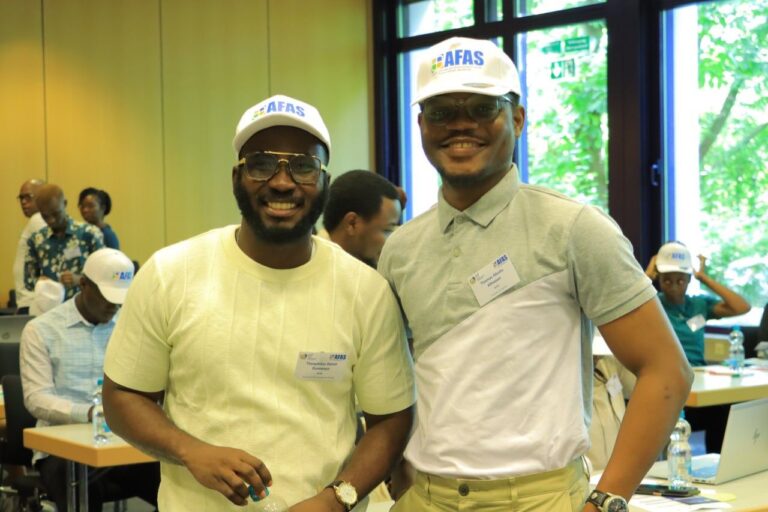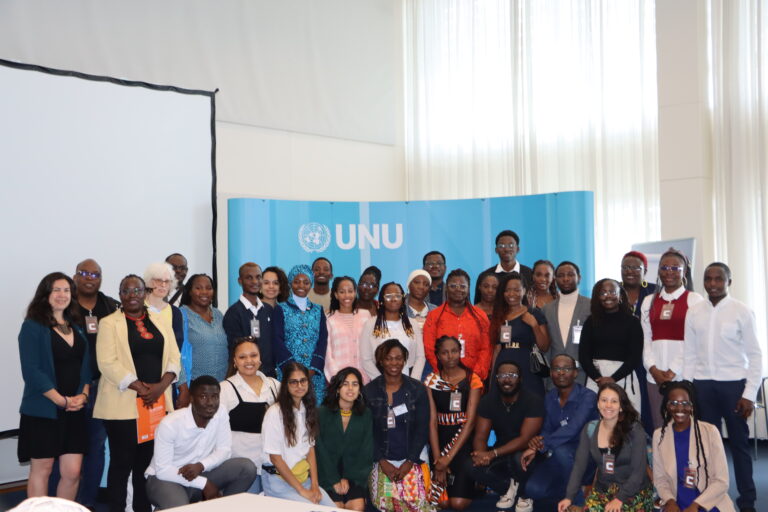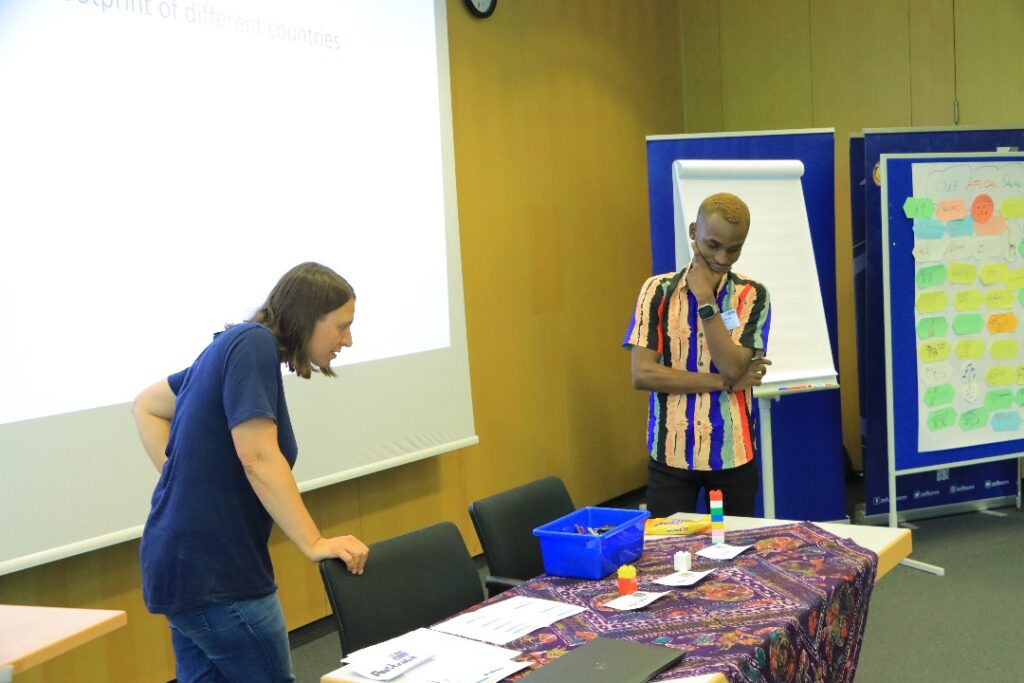As students and researchers of the DAAD’s African Climate and Environment Center-Future African Savannas (AFAS), we are provided with the unique opportunity to apply SPPI frameworks in our projects. The AFAS Summer School in Germany emphasized the importance of interdisciplinary dialogue and collaborative learning, aligning with the SPPI principle of stakeholder engagement. This approach bridges the gap between scientific research and real-world practice, contributing to the sustainable development of Africa’s savanna ecosystems. The program’s focus on practical applications, including field visits and sessions with experts like Professor Joachim von Braun’s on Climate Resilient Food Systems, highlighted the urgency of addressing vulnerabilities in food systems and translating scientific knowledge into actionable policies. Additionally, the UNCCD visit highlighted the role of the Science-Policy Interface (SPI) in translating research into actionable policy, especially in areas like land degradation and drought (De Donà, 2017). The session’s exposure to global and local initiatives and practical experiences like the Bonn Botanical Garden tour highlighted the interconnected nature of SPPI efforts at various scales. Ensuring collaborative research and engaging local communities in the decision-making process, the AFAS Summer School equips participants with the tools to ensure that the future of Africa’s savannas is built on strong, evidence-based science-policy-practice interfaces.

In the remainder of this blog, we will explore how Science-Policy-Practice Interfaces (SPPIs) are used in African savannas to bridge the gap between scientific knowledge, policy-making, and practical solutions. This discussion will include examples from various regions where SPPIs have successfully informed sustainable practices and also address some of the challenges they face in their implementation.
African savannas are home to diverse ecosystems and millions of people face growing environmental challenges, including climate change, land degradation, and biodiversity loss. The sustainability of these ecosystems is not just a local concern, it has global implications for biodiversity, carbon sequestration, and climate resilience. Despite growing scientific knowledge on addressing these issues, a gap often remains between research, policy-making, and practical action. This is where Science-Policy-Practice Interfaces (SPPIs) come into play. SPPIs are essential frameworks that ensure scientific knowledge informs policy and real-world applications. These interfaces help ensure that research does not stay within the academic realm but is actively translated into policies that benefit communities and ecosystems alike (von Braun & Kalkuhl, 2015).
SPPIs in African savannas seek to incorporate scientific discoveries into policy-making and practical solutions that promote socioeconomic stability and sustainable development. Millions of people depend on these biologically rich ecosystems for their livelihoods, but they are increasingly vulnerable due to resource scarcity, land degradation, and climate change. SPPIs provide platforms where researchers, policymakers, and local communities collaborate, ensuring that scientific insights are used in land management, conservation, and livelihood decision-making processes. For instance, integrating scientific knowledge about climate resilience with policy decisions on land use can reduce the risks of overgrazing and desertification while promoting sustainable agricultural practices (Buyana 2020).
While SPPIs hold significant potential, their effectiveness in the African context faces numerous challenges, such as diverse socio-political landscapes, resource limitations, and communication barriers between scientists, policymakers, and local communities (Kedibone, 2022; Weichselgartner and Kasperson, 2010). Many African governments face competing priorities, which can result in insufficient funding and attention to environmental issues. Additionally, local communities may have deep-rooted traditional knowledge systems that do not always align with scientific approaches, creating resistance to externally introduced conservation or land management practices (Cassin and Ochoa-Tocachi, 2021). Nevertheless, SPPIs can overcome these obstacles by emphasizing stakeholder participation and ensuring that scientific solutions are culturally viable.
In regions like the East African savannas, successful SPPI implementations, such as the collaboration between local communities and the Kenya Wildlife Service (KWS), have demonstrated the importance of using scientific knowledge to mitigate human-wildlife conflicts and improve conservation efforts (Homewood et al., 2019). Through the SPPI approach, scientific insights into animal behavior and migration have been translated into practical policies that protect both wildlife and local livelihoods. It has informed policy decisions about where to establish wildlife corridors and how to design deterrents that prevent wildlife from entering agricultural lands. The outcome has been significant, local communities now play an active role in conservation efforts, benefiting from tourism revenues while also protecting their farms from damage. This collaboration demonstrates how the integration of science, policy, and practice can produce sustainable outcomes that balance the needs of both people and nature.
Similarly, in the Zambezi Basin, an SPPI was employed to develop community-led conservation plans that balance agricultural development with wildlife protection. The region faces significant challenges due to land-use conflicts, as both agriculture and conservation compete for space. Through community engagement in the process, the SPPI ensured that the conservation strategies were tailored to local needs and conditions (Hiscock et al., 1996). This initiative brought together scientists, government agencies, and community leaders in workshops and field visits to co-create solutions. For example, rotational grazing plans were developed based on scientific research about sustainable grazing patterns, and buffer zones were established to separate agricultural areas from wildlife habitats. As a result, biodiversity conservation goals were met while ensuring that communities could continue their agricultural activities.
SPPIs come in various forms, from large international institutions to local community-driven initiatives. Some, like the Intergovernmental Science-Policy Platform on Biodiversity and Ecosystem Services (IPBES), provide global frameworks for biodiversity conservation. Others, such as informal relationships or National Ecosystem Assessments, are more localized but equally essential. In the context of African savannas, local SPPIs often involve workshops, focus group discussions, and knowledge-sharing platforms. A critical success factor for these initiatives is stakeholder engagement. Involving local communities in every step from research design to policy implementation, SPPIs can ensure that solutions are both scientifically sound and socially acceptable (Adeyemo, 2023).


Also, there are many ways to operationalize SPPIs, and the choice of model depends on the context. The Model of Science Engagement, which advocates for strong public engagement in the production and use of scientific knowledge (Wyborn et al., 2017), has been particularly successful in some African savannas. Through participatory science and transdisciplinary research, local communities are involved not just as beneficiaries but as co-creators of knowledge. For instance, in Ghana’s Northern Region, where climate-smart agricultural practices have been successfully integrated into farming through collaboration between researchers, policymakers, and local farmers. Climate-smart agriculture includes practices like crop rotation, agroforestry, and improved water-use efficiency, which help mitigate the impacts of climate change on agriculture while enhancing food security (Zougmoré et al., 2019). Researchers shared insights on climate change impacts, while policymakers created incentives for farmers to adopt sustainable practices. Farmers contributed their traditional knowledge, helping to tailor and implement scientific recommendations. This collaboration improved crop yields, enhanced soil conservation, and increased resilience to droughts, showcasing how SPPIs can drive practical, positive changes for both the environment and local economies.
Similarly, the Model of Knowledge Transfer, which focuses on the direct dissemination of research findings to policymakers, has proven effective in driving policy change. In South Africa, researchers working with policymakers have used policy briefs to highlight the urgent need for sustainable land use planning in savanna regions affected by urban expansion. This has led to the adoption of new zoning laws that protect critical wildlife corridors while allowing for controlled urban growth (Phago and Mazarire, 2021).
Science-Policy-Practice Interfaces (SPPIs) offer a critical pathway to address the pressing environmental challenges faced by African savannas. SPPIs foster sustainable solutions by blending scientific research, policy-making, and practical applications, ensuring a balance between the needs of local communities, ecosystems, and biodiversity. Successful examples from regions like the East African savannas and the Zambezi Basin illustrate how SPPI frameworks can drive positive change. However, to maximize their potential, continued emphasis on stakeholder engagement, cultural viability, and cross-disciplinary collaboration is essential. Through platforms like the AFAS Summer School, researchers and policymakers are equipped to bridge knowledge gaps and create actionable, evidence-based policies for the sustainable development of Africa’s savanna ecosystems.
References
Information about the authors:
Thomas Abudu Alhassan is an AFAS Scholar of the 2nd MSc cohort based at the University of Nairobi in Kenya. (alhassan.thomas48[at]students.uonbi.ac.ke)
Theophilus Delali Dumenyo is an AFAS Scholar of the 2nd MSc cohort based at the Université Félix Houphouët-Boigny in Côte d’Ivoire.(delatheophilus[at]gmail.com)
Kabir Adekunle Adelakun is an AFAS Scholar of the 2nd MSc cohort based at the Université Félix Houphouët-Boigny in Côte d’Ivoire.(Kabiradelakun3[at]gmail.com)
© Photos by: AFAS/Zerihune Wube Emiru